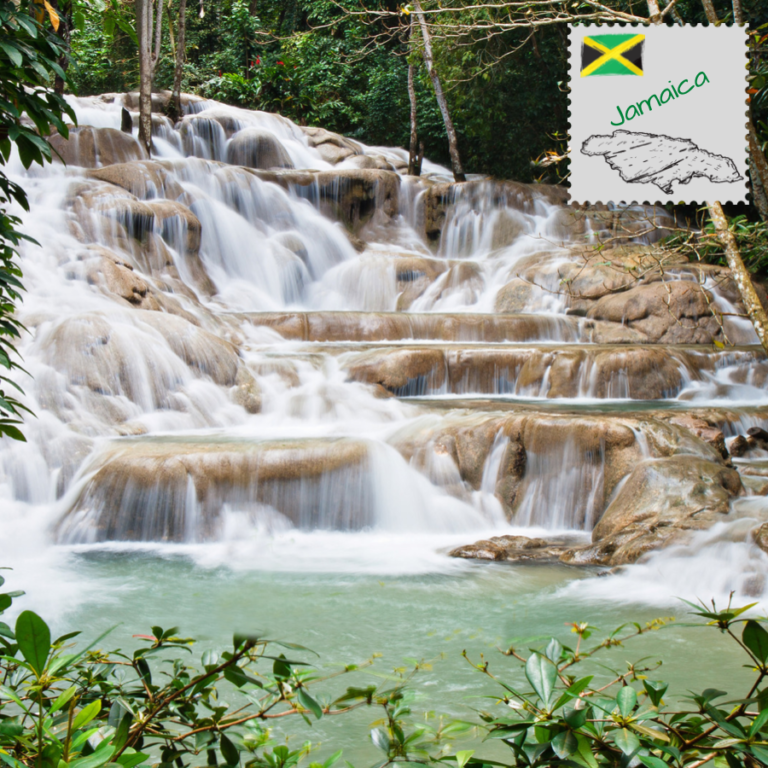
Jamaica is the Caribbean’s third-largest and most populous of the English-speaking islands. Its terrain includes beaches, rivers with waterfalls, caves, and forests with lush tropical foliage. The Blue Mountains rise in the island’s east. Ruins of stone sugar mills also dot the landscape. With the landscape almost developed in pockets, each of the major cities within Jamaica offers unique experiences.


The official language of Jamaica is English, but the unofficial language is patois. Linguists and a handful of Jamaican novelists have recently transformed this oral language into written form, although for most Jamaicans it remains solely spoken — and richly nuanced.

The unit of currency is the Jamaican dollar, the ‘jay,’ which uses the same symbol as the US dollar ($). Jamaican currency is issued in banknotes of J$50, J$100, J$500, J$1000, and (rarely) J$5000. Prices for hotels and valuable items are usually quoted in US dollars, which are widely accepted.

U.S. citizens are generally required to present a valid U.S. passport when traveling to Jamaica, as well as proof of anticipated departure from Jamaica. You do not need a visa for tourist travel up to 90 days.

As long as you use an international service plane or an unlocked GSM cell phone, it should work in Jamaica. If you are from Canada and you unlock your cell phone before you leave for Jamaica, it should work with no issues. Wi-fi is available in Jamaican hotels, but internet access is still restricted in rural areas. Most town libraries offer internet access (US$1 for 30 minutes), and there’s usually at least one commercial entity where you can get online.

Hotels A 10% tip is normal in hotels and restaurants. Restaurants Check your bill carefully – some restaurants automatically add a 10% to 15% service charge. Resorts Some all-inclusive resorts have a strictly enforced no-tipping policy. Taxis Outside Kingston, tourist taxi drivers often ask for tips but it is not necessary; JUTA (Jamaica Union of Travelers Association) route taxis do not expect tips.

Most towns have 24-hour ATMs linked to international networks such as Cirrus or Plus. In more remote areas, look for ATMs at gas stations. In tourist areas, some ATMs also dispense US dollars.

You don’t need a power plug adapter in Jamaica when living in the United States of America. Be extra careful with certain appliances because of the difference in frequency. In Jamaica, the power plugs and sockets are of type A and B. The standard voltage is 110 V and the standard frequency is 50 Hz.

The best time to visit Jamaica is November to mid-December. That’s when the island’s already beautiful weather (ranging from the mid-70s to the high 80s all year-round) is the most pleasant and the hotel and flight deals are the easiest to find.
The best way to get around Jamaica is by taxi, whether you’re coming from one of the airports – Montego Bay’s Sangster International Airport (MBJ) is the most accessible to the tourist areas – or making your way around town. Renting a car is also an option, but driving on the left side of the road can be confusing, road signs are unhelpful, drivers can be aggressive and potholes are rampant. Many cruise lines, including Carnival, Celebrity, and Holland America, make stops in Jamaica. They usually head for Montego Bay on the northwestern side of Ocho Rios in the northeast.
aking a cab or minibus will be the safest and most hassle-free way to get around Jamaica. But you should only take the official taxis that are operated by the Jamaica Union of Travelers Association (JUTA) or Jamaica Co-operative Automobile & Limousine Tours (JCAL), as indicated by the acronym on their vehicles. The most affordable taxis are communal “route taxis,” which pick up at certain spots throughout the island and drive to certain locations. Look for the red and white license plates with “P” or “PPV” appearing before the number. Many taxi meters are broken, so agree on a price before accepting the ride. As for tipping, you should budget in 10 to 15 percent of the fare – more if you’re traveling late at night.
Cheap travel between towns, but often overcrowded and dangerously driven. More expensive and reliable scheduled coaches connect larger towns. Large buses are few and far between in Jamaica due to the narrow twisting roads. Throughout the island, there are bus stops at most road intersections along routes, but you can usually flag down a bus anywhere except in major cities. If the bus doesn’t have a bell to indicate when you want to get off, shout out ‘let down’ or ‘one stop’ to the driver.
Useful for traveling at your own pace, or for visiting regions with minimal public transportation. Cars can be hired in every town or city. Drive on the left. If you do want to rent a car, do so at the airport you fly into for reliable service and inventory.
In Kingston, most domestic flights use Tinson Pen, 3km west of downtown; it’s a 40-minute ride to the domestic airstrip from Norman Manley International Airport. Ian Fleming Aerodrome near Ocho Rios handles private charters.
Jamaica’s train system, once mainly used to transport bauxite, is defunct. However, recent Chinese investment is due to see the railway from Kingston to Montego Bay revived by late 2020, with a stop at the Appleton Rum Estate.
Tourists may use boats for day trips, but there are currently no organized boat services for getting from A to B in Jamaica. Paradise Ferry (www.paradiseferry.com) has a planned ferry service between Ocho Rios, Montego Bay, and Negril, though in early 2019 it was still at the ‘soon come’ stage.
Jamaican cuisine includes a mixture of cooking techniques, flavors, and spices influenced by Amerindian, African, Irish, English, French, Portuguese, Spanish, Indian, Chinese, and Middle Eastern people who have inhabited the island. It is also influenced by the crops introduced into the island from tropical Southeast Asia. All of which are now grown locally in Jamaica. A wide variety of seafood, tropical fruits, and meats are available. Some Jamaican dishes are variations on cuisines brought to the island from elsewhere. These are often modified to incorporate local produce and spices. Others are novel or fusion and have developed locally. Popular Jamaican dishes include curry goat, fried dumplings, and ackee and saltfish. Jamaican patties along with various pastries, bread, and beverages are also popular.
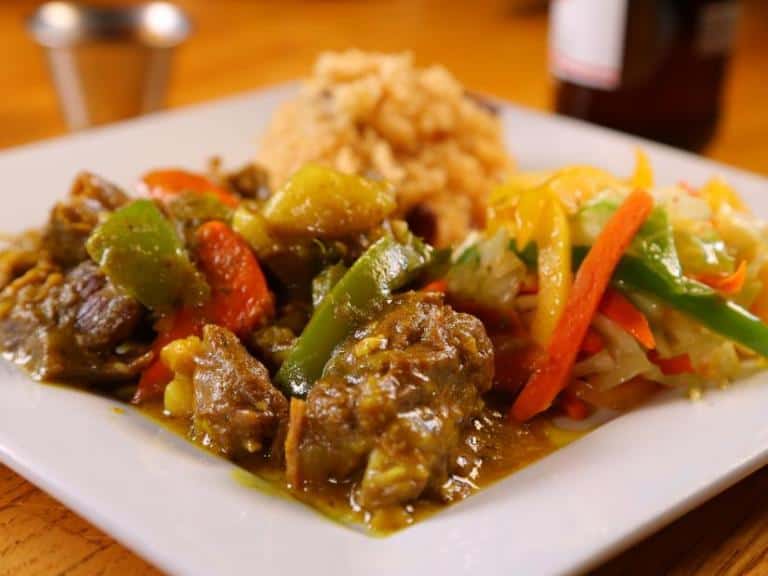
Ever wanted to stay in a luxury treehouse? Or on the grounds of a castle? Or maybe in a villa above water? There’s an enchanting place to stay in Jamaica to match almost every type of budget and imagination possible. Friends, families, couples, groups, and solo travelers can all enjoy a piece of paradise with lodging to suit every need. Vacation apartments offer the convenience of exploring at your own pace and time. They run the gamut from cozy studios and one-bedrooms to luxury penthouse suites with butler service, manicured lawns, and upscale amenities. A villa offers up conveniences similar to an apartment with lots of space for yourself, but with many more amenities for you to enjoy right on the property. If you’d like to be taken care of in a more intimate, family-style setting, then check in to one of our top-notch guesthouses. Hotels in Jamaica also run the spectrum of ample comforts and lavish grandeur. You’ll find hotels close to the city action and ones tucked far atop the cool, scenic mountains with breathtaking views. You’ll get excited about the daily activities, vibrant local and international restaurants, and entertaining swim-up bars with friendly staff and strong cocktails.
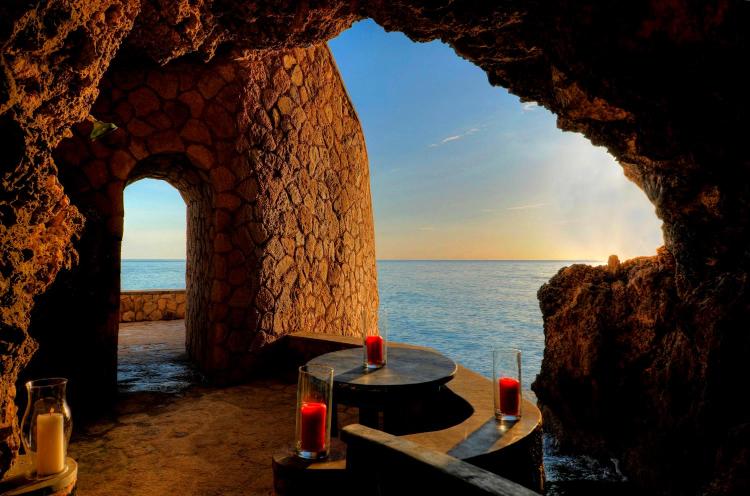
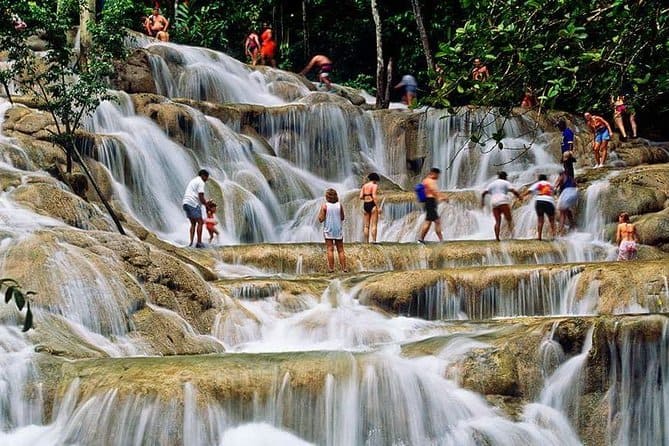
Dunn’s River Falls is unique, and just like Reggae, the 180-foot high and 600-foot long landmark is world-famous. It stands as a living testament to Jamaica’s natural beauty and is the most popular of all the Jamaican falls, attracting millions of the world’s visitors each year.
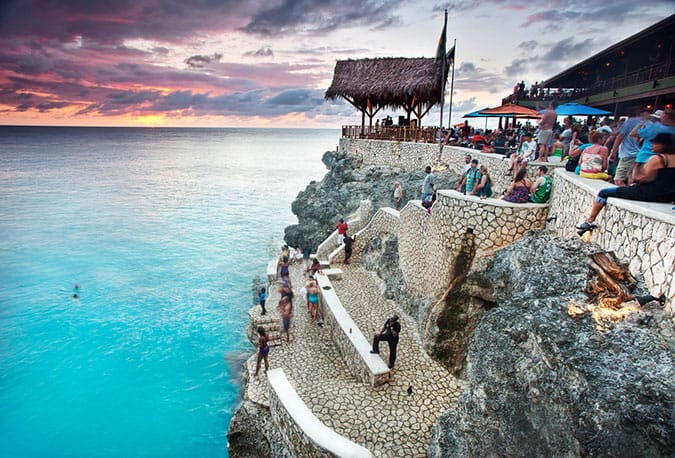
Rick’s Café is known for having an unrivaled view of the sunset in Jamaica. Set in the West End atop a 35-foot high cliff, it is also known for heart-throbbing, exhilarating cliff jumping!
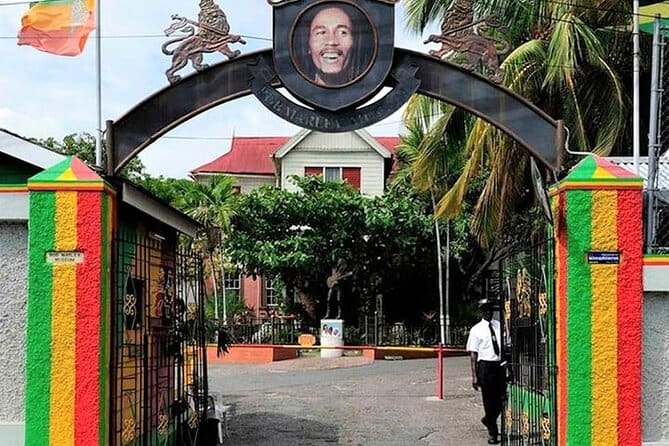
The Bob Marley Museum is a museum in Kingston, Jamaica, dedicated to the reggae musician Bob Marley. The museum is located at 56 Hope Road, Kingston, and is Bob Marley’s former place of residence. It was home to the Tuff Gong reggae record label which was founded by The Wailers in 1970.

Accompong is a historical Maroon village located in the hills of St. Elizabeth Parish on the island of Jamaica. It is located in Cockpit Country, where Jamaican Maroons and indigenous Taíno established a fortified stronghold in the hilly terrain in the 17th century.
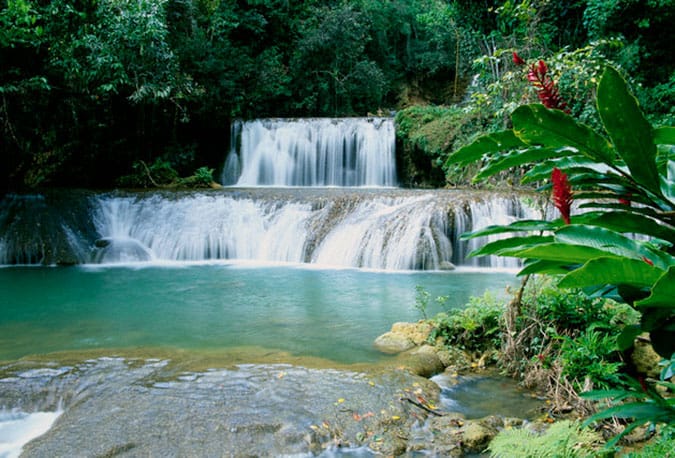
YS Falls Is one of Jamaica’s finest natural attractions. A scenic destination with 7 waterfalls cascading into natural swimming pools amid lush gardens.
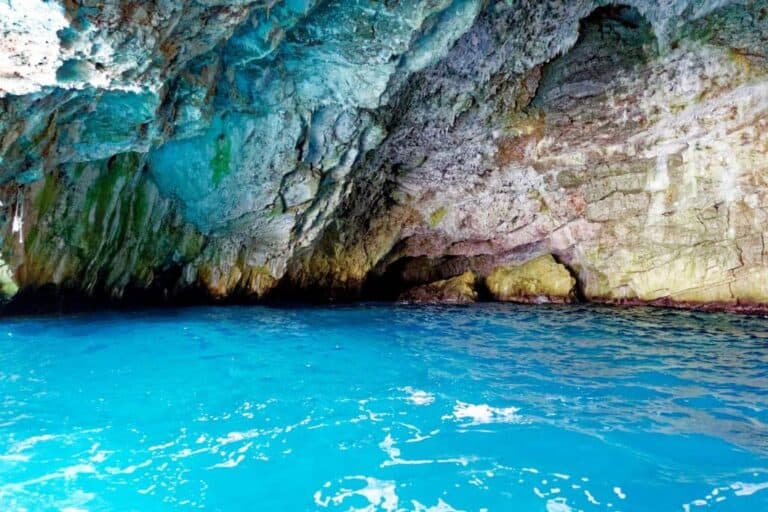
Located off the beaten path in a remote part of Jamaica, is Blue Hole Mineral Spring that remains open until the early hours of the morning when the last person leaves. With the surface of the chilly water 25 feet below the land, visitors either dive in or climb down a ladder. It’s another 30 feet to the bottom. The cavernous opening is completely encased in Karst limestone, a naturally occurring mineral that filters the steady upwelling of water, leaving behind a clear, clean pool.
Accommodation:
Hotel or Hostel (single): $28
Double-occupancy room: $57
Food
Meals for one day: $8.38
Transportation
Taxis, local buses, train: $3.68
Intercity: $5.05
Taxi from airport: $14
Entertainment
Entrance tickets & shows: $7.24
Admission to Doctor’s Cave Beach: $2.83
Admission to Coyababa Gardens: $5.65
Tour of Brimmer Hall Estate: $11
Tour of Rose Hall: $15
Snorkeling trip: $20
1-Tank dive: $40
1.5-2-hr Horseback ride: $45
Tour of Prospect Plantation: $19
Alcohol
Drinks for one day: $2.96
Accommodation
Hotel or rental home (single): $71
Double-occupancy room: $143
Food
Meals for one day: $20
Transportation
Taxis or Car rental: $9.44
Intercity: $13
Taxi from airport: $14
Entertainment
Entrance tickets & shows: $19
Admission to Doctor’s Cave Beach: $2.83
Admission to Coyababa Gardens: $5.65
Tour of Brimmer Hall Estate: $11
Tour of Rose Hall: $15
Snorkeling trip: $20
1-Tank dive: $40
1.5-2-hr Horseback ride: $45
Tour of Prospect Plantation: $19
Alcohol
Drinks for one day: $7.04
Accommodation
Resort or hotel (single): $178
Double-occupancy room: $357
Food
Meals for one day: $47
Transportation
Car Rentals or private driver: $25
Intercity: $34
Taxi from airport: $14
Entertainment
Entrance tickets & shows: $49
Admission to Doctor’s Cave Beach: $2.83
Admission to Coyababa Gardens: $5.65
Tour of Brimmer Hall Estate: $11
Tour of Rose Hall: $15
Snorkeling trip: $20
1-Tank dive: $40
1.5-2-hr Horseback ride: $45
Tour of Prospect Plantation: $19
Alcohol
Drinks for one day: $15
When planning for your trip to Jamaica, don’t forget about travel insurance! You never know what might happen and it’s better to be safe than sorry.

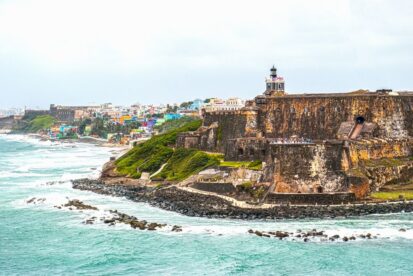

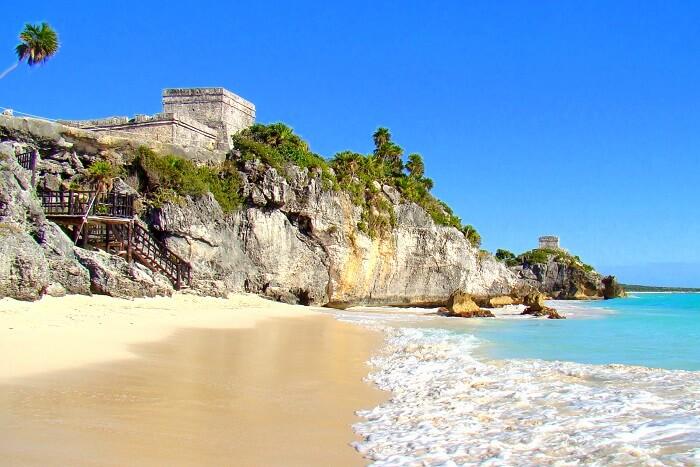
Interested in traveling the world while getting paid? Here at Diversifying Globetrotters LLC, we are partnered with Melanin On The Map and Travel Coach Network to help people across the world find financial, personal, and time freedom. Join the hundreds of others making the change to better themselves while exploring the world and adding money to their pockets.